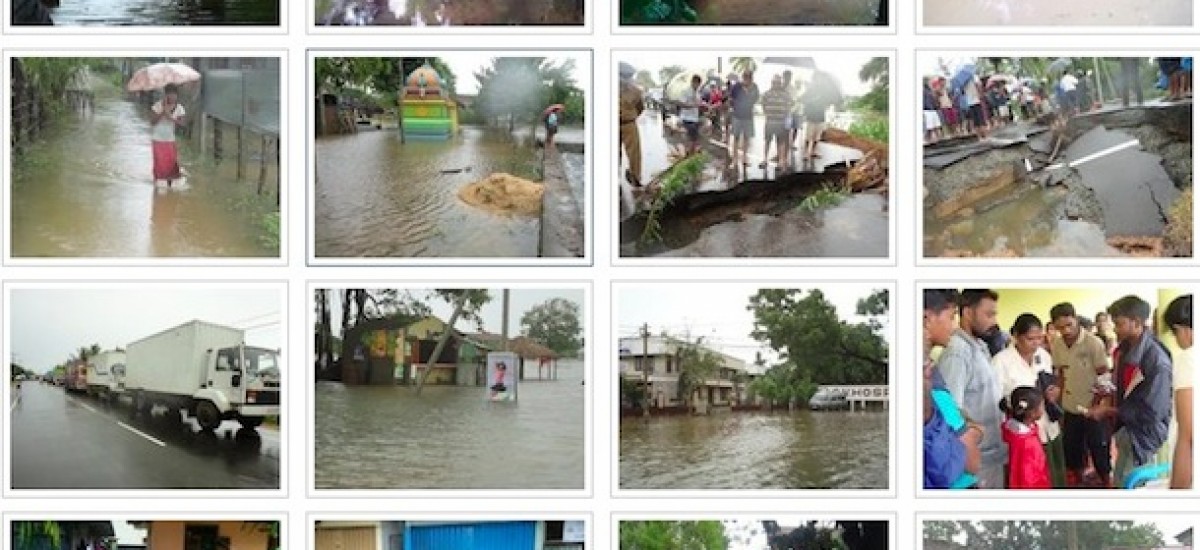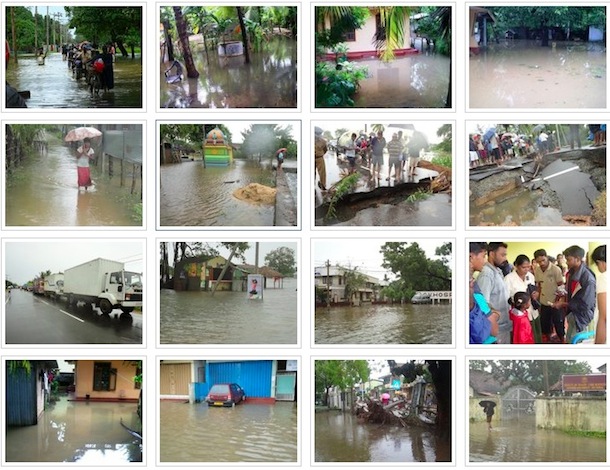Photos courtesy Batticaloa Facebook Page
I haven’t been reading the news much lately. I heard about the floods in the East and North Central Province and thought abstractly to myself, ‘how awful’. I watched the downpour in Colombo itself and complained about the shivering cold of that one day during which temperatures fell to 18 degrees – the lowest in over 60 years.
I never really fathomed the extent of the destruction until I happened across a 3-line post on a blog, linking to some footage by the airforce of the flooding in Batticaloa. I didn’t pay much attention to the article on the airforce site, but those pictures stunned me. Water up to treetops. Acre upon acre of paddy land totally destroyed. All I could think was, ‘haven’t they been through enough?’
War. Tsunami. Floods. Would it ever stop? Would they ever have the luxury of having normal lives again? Would there ever come a time when they would stop having to start over? I felt an immense tiredness for them as well as an odd admiration for their unending resilience and ability to survive disaster upon disaster. This post was a result of those feelings – a grossly inadequate but well-meant tribute to their struggle.
###
When the skies rumbled, angry and blistered with grey clouds, we were happy. Rain has mostly been our friend – a welcome drink for thirsty fields; a muddy playground for restless babies.
I myself have always loved the rain. As a child I would run out whenever my mother’s back was turned and spin like a runaway firework in the moving, liquid soil. Brown would squelch up between my toes and ooze onto my feet and the cooling sensation would make me swoon. My country is often hot and in those days, rain meant relief. I would open my mouth to it, my mother’s distant scoldings unheeded, and drink with an eagerness than frightened me. As if I was trying to drink in the secrets of all of nature. And the water would not only quench my thirst; it somehow made me stronger. My feet always stomped harder after that first drink; mud would explode outwards, all around me, and I would feel invincible.
Even as I grew up and learned that explosions were not always joyous, I never stopped loving that rain. In the most bitter times, it would still taste sweet, and remind me of younger, happier days, when nothing ugly seemed to exist. When my world was solely and selfishly my own. I had no real worries then. If I cried I would be fed; if I couldn’t sleep my mother would stroke my back until the feel of her fingertips on my skin numbed me into unconsciousness. And if I was thirsty, I always had the rain.
My father was a farmer and so we lived by the rain. When it didn’t come, we, along with our crops, were devastated. Money was short, food scarce, tempers dark with hunger. Rain for us meant green, growth, abundance, food in our stomachs. As I grew older, when I ran out into the rain, it was to give thanks.
“You love the rain more than me” my lover accused once when my eyes were drawn one too many times to the streaming water outside and away from his dry, smooth skin. “No” I had replied, forcing my gaze away; but I was lying.
If someone had told me then that rain would one day be one of the many strikes against my family, village and people, I would have defended my friend. Even then I knew of horror. The horror of being trapped in a battle I was not fighting; where each side was as deadly as the other; where there was no such thing as winning. I knew about bullets and shrapnel; the cries of wounded men and grieving children. Later, I would learn the horror of the sea – its deadly reach and house-ripping force. I would learn about loss when searching for my lover in the wake of the surge – a search that would come to nothing.
Long ago, I had stopped feeling betrayed. I used to feel as if the Gods were punishing us until I stopped believing in them. Invisible and conveniently absent deities – deaf to the wailing of the mourners and the tears of orphans – passing out judgments of life and death didn’t seem very God-like to me.
Besides, where is the point in berating these blind Gods? When living with such horror, there is no need for Gods – only survival. And survival takes up all your strength. To piece together shattered nerves, stem the bleeding of wounded hearts; to simply be normal again takes up all your strength until there is none left, even to pray.
But the rain…! From the day it began until the day it ended, it felt like a stranger. I looked outside at the heavy, angry water beating itself into the earth, and for the first time, felt fearful. Our young paddy drowned in hours. Mud stopped being a plaything and became an insidious trap for careless, panicked feet. And when I ran outside, the water felt like hail on my skin. I did not feel refreshed as I usually do, but soaked through and too waterlogged to move. It was as if even my hair was weighing me down. What rain was this, that was more an impediment than a joy? It was no rain I ever knew.
When my father rushed into the house, the water making rivulets in every crease and hollow of his thin body, we knew immediately that we had to run. No words were exchanged; we all grabbed what we could reach and bolted from a home we knew we would never see again. It took several minutes of running to realize the only object I had taken was half a loaf of bread, now soggy and melting into the fast rising water at our feet. I threw it away and it was lost in an instant.
I don’t know how long we ran, or how far. I could only hear the tired encouragements of my father, urging us desperately onward, and the hoarse panting of my mother as I pushed her in front of me, terrified she would fall if I didn’t. My face was pouring with sweat despite the onslaught from above and for the first time I felt the rain pull the energy out of me instead of pouring it in. My panicked sobs ripped out of me in short, panted gasps; the ugliest sound I’d ever heard; worse somehow than distant shelling.
And the rain went on, long after we reached shelter and even as we received news of more and more devastation in the place we once called our home. I watched my parents suddenly age a hundred years; too old now to start over as they had done before. Turned ancient in a matter of days, they looked at me with expressions I had used on them before; but never them on me – dependence. The rain had rendered them old and me, suddenly, their parent.
*
Eventually, the sky ran out of tears; and the soil began to soak up the flooding. In a while, I would be able to leave this shelter and go back… to what? I have no home; I must rebuild it. My parents have done so before for my sake and I will do it today for theirs. I know now that their resilience was a lesson I learned without realizing it; that even throughout my carefree days of running in the rain, I somehow absorbed this miraculous skill. Did it seep into the pores of my bare feet as they splashed through the mud? Or did the rain feed my open, laughing mouth with reserves of strength that I would need to counter its future betrayal?
I walked outside a while, reveling unfamiliarly in the dryness of my surroundings. The grass at my feet waved innocently in the breeze, looking refreshed and reborn and I wondered at the resilience of nature itself. Entire villages like mine were destroyed; houses like mine were swept away in a drowning tide; but this grass with its shallow network of roots survived – growing only fatter and greener as a result of the downpour. Its triumphant dance in the wind that day mocked me, but at the same, gave me strength.
I would put down my roots again, but they would be shallow. My naïve trust in the rain had vanished forever: I had lost a friend, but in doing so, had been taught to be ready for the next time. Ready to run. Ready for my world to end but also to begin, yet again.


